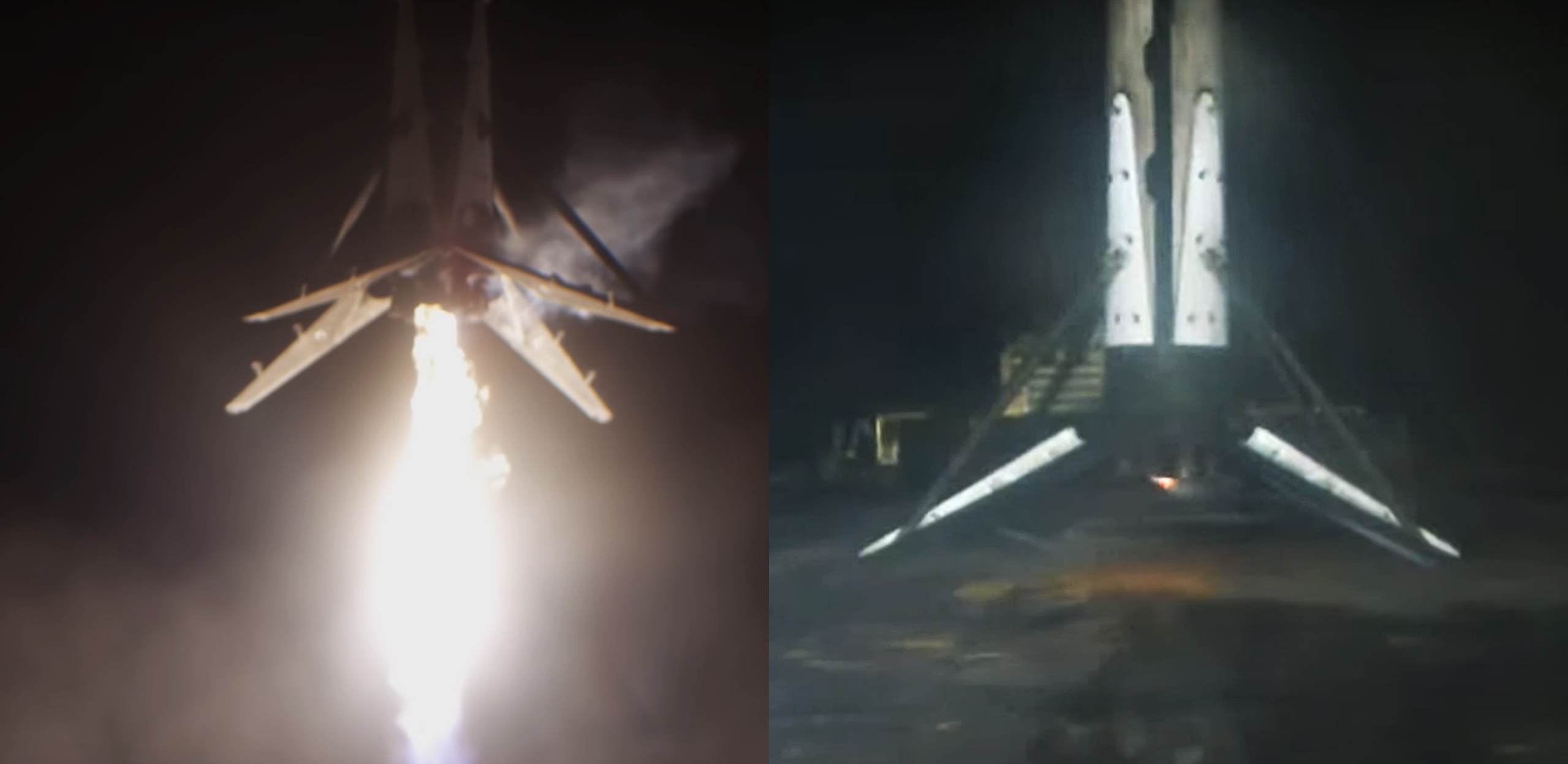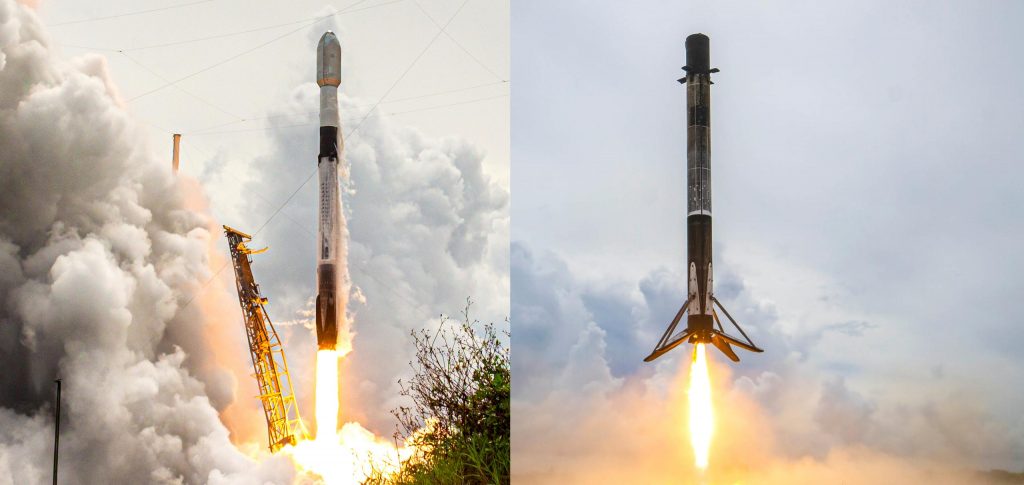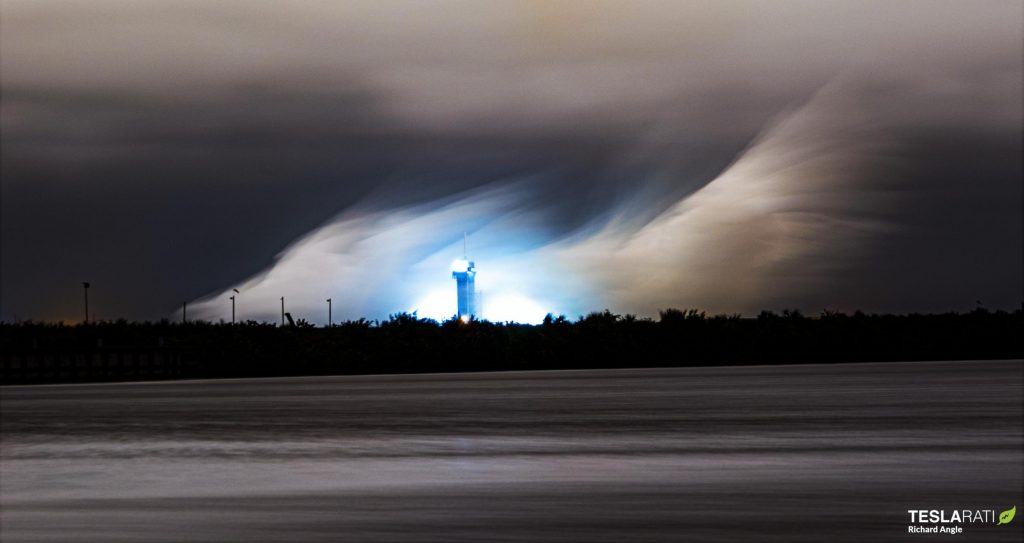

News
SpaceX lands 100th Falcon booster
Exactly six years after its first successful recovery, SpaceX has landed a Falcon booster for the 100th time.
On December 21st, 2015, the first Falcon 9 V1.2 Full Thrust (Block 1) rocket lifted off from SpaceX’s Cape Canaveral LC-40 launch pad on the company’s return-to-flight mission after a catastrophic in-flight failure just six months prior. Unwilling as ever to waste an opportunity, no matter how important the mission, SpaceX – on top of debuting a major Falcon 9 upgrade – chose to take advantage of the return to flight to attempt to land a Falcon booster back on land for the first time ever. Ultimately, on top of successfully deploying multiple Orbcomm OG2 communications satellites in orbit for a paying customer, Falcon 9 booster B1019 sailed through its boostback, reentry, and landing burns without issue. About nine minutes after liftoff, the rocket ultimately touched down on a concrete “landing zone” just a few miles from where it lifted off with uncanny ease relative to SpaceX’s numerous failed attempts in the ~18 months prior.
Exactly six years later, on December 21st, 2021, Falcon 9 booster B1069 lifted off from Kennedy Space Center (KSC) Pad 39A with an upgraded, flight-proven Cargo Dragon in tow for SpaceX’s 24th International Space Station (ISS) resupply mission. CRS-24 also marked the company’s 31st and final launch of 2021, representing more successful Falcon launches completed in a single year than SpaceX had even attempted in its entire nine-year history up to the point of that first successful booster landing.
Unlike B1019 and its anxiety-ridden launch and first-of-its-kind recovery attempt, Falcon booster landings are now not only routine but expected. For SpaceX, a launch without a landing – intentionally or by accident – is now so unusual that it’s practically more newsworthy than the alternative. Of the 57 launches SpaceX has now completed in the last two years, only 4 did not include a successful booster landing – of which only the loss of one was intentional.
CRS-24 was no different. About nine minutes after liftoff, after a flawless ascent, stage separation, and reentry burn, Falcon 9 B1069 fired up its engines once more and landed softly aboard drone ship Just Read The Instructions (JRTI). Anything less would have been an oddity and a major loss for SpaceX, given that a full four Falcon boosters have already singlehandedly supported nine or more launches. The unintentional loss of any booster is already hard to swallow but it’s even more painful to lose a new booster that might have otherwise bastioned SpaceX’s fleet and supported another 10+ launches in just a year or two.

Thankfully, no such fate befell B1069 and the booster now has a potentially long and productive life of launches in front of it. With just a single NASA mission under its belt, the Falcon 9 is a prime candidate to launch SpaceX’s upcoming Axiom-1 private astronaut mission, though it could just as easily support any number of upcoming missions for the US military, NASA, the Italian Space Agency (ASI), or other major customers.
Now safely in orbit, the uncrewed Dragon 2 capsule C209 – carrying 3 tons (~6500 lb) of cargo – will make its way to the ISS for the second time and dock with the station as early as 4:30 am EDT (09:30 UTC), Wednesday, December 22nd. It’ll be the capsule’s second space station arrival in a little over six months.

News
Tesla cleared in Canada EV rebate investigation
Tesla has been cleared in an investigation into the company’s staggering number of EV rebate claims in Canada in January.

Canadian officials have cleared Tesla following an investigation into a large number of claims submitted to the country’s electric vehicle (EV) rebates earlier this year.
Transport Canada has ruled that there was no evidence of fraud after Tesla submitted 8,653 EV rebate claims for the country’s Incentives for Zero-Emission Vehicles (iZEV) program, as detailed in a report on Friday from The Globe and Mail. Despite the huge number of claims, Canadian authorities have found that the figure represented vehicles that had been delivered prior to the submission deadline for the program.
According to Transport Minister Chrystia Freeland, the claims “were determined to legitimately represent cars sold before January 12,” which was the final day for OEMs to submit these claims before the government suspended the program.
Upon initial reporting of the Tesla claims submitted in January, it was estimated that they were valued at around $43 million. In March, Freeland and Transport Canada opened the investigation into Tesla, noting that they would be freezing the rebate payments until the claims were found to be valid.
READ MORE ON ELECTRIC VEHICLES: EVs getting cleaner more quickly than expected in Europe: study
Huw Williams, Canadian Automobile Dealers Association Public Affairs Director, accepted the results of the investigation, while also questioning how Tesla knew to submit the claims that weekend, just before the program ran out.
“I think there’s a larger question as to how Tesla knew to run those through on that weekend,” Williams said. “It doesn’t appear to me that we have an investigation into any communication between Transport Canada and Tesla, between officials who may have shared information inappropriately.”
Tesla sales have been down in Canada for the first half of this year, amidst turmoil between the country and the Trump administration’s tariffs. Although Elon Musk has since stepped back from his role with the administration, a number of companies and officials in Canada were calling for a boycott of Tesla’s vehicles earlier this year, due in part to his association with Trump.
News
Tesla Semis to get 18 new Megachargers at this PepsiCo plant
PepsiCo is set to add more Tesla Semi Megachargers, this time at a facility in North Carolina.

Tesla partner PepsiCo is set to build new Semi charging stations at one of its manufacturing sites, as revealed in new permitting plans shared this week.
On Friday, Tesla charging station scout MarcoRP shared plans on X for 18 Semi Megacharging stalls at PepsiCo’s facility in Charlotte, North Carolina, coming as the latest update plans for the company’s increasingly electrified fleet. The stalls are set to be built side by side, along with three Tesla Megapack grid-scale battery systems.
The plans also note the faster charging speeds for the chargers, which can charge the Class 8 Semi at speeds of up to 1MW. Tesla says that the speed can charge the Semi back to roughly 70 percent in around 30 minutes.
You can see the site plans for the PepsiCo North Carolina Megacharger below.

Credit: PepsiCo (via MarcoRPi1 on X)

Credit: PepsiCo (via MarcoRPi1 on X)
READ MORE ON THE TESLA SEMI: Tesla to build Semi Megacharger station in Southern California
PepsiCo’s Tesla Semi fleet, other Megachargers, and initial tests and deliveries
PepsiCo was the first external customer to take delivery of Tesla’s Semis back in 2023, starting with just an initial order of 15. Since then, the company has continued to expand the fleet, recently taking delivery of an additional 50 units in California. The PepsiCo fleet was up to around 86 units as of last year, according to statements from Semi Senior Manager Dan Priestley.
Additionally, the company has similar Megachargers at its facilities in Modesto, Sacramento, and Fresno, California, and Tesla also submitted plans for approval to build 12 new Megacharging stalls in Los Angeles County.
Over the past couple of years, Tesla has also been delivering the electric Class 8 units to a number of other companies for pilot programs, and Priestley shared some results from PepsiCo’s initial Semi tests last year. Notably, the executive spoke with a handful of PepsiCo workers who said they really liked the Semi and wouldn’t plan on going back to diesel trucks.
The company is also nearing completion of a higher-volume Semi plant at its Gigafactory in Nevada, which is expected to eventually have an annual production capacity of 50,000 Semi units.
Tesla executive teases plan to further electrify supply chain
News
Tesla sales soar in Norway with new Model Y leading the charge
Tesla recorded a 54% year-over-year jump in new vehicle registrations in June.

Tesla is seeing strong momentum in Norway, with sales of the new Model Y helping the company maintain dominance in one of the world’s most electric vehicle-friendly markets.
Model Y upgrades and consumer preferences
According to the Norwegian Road Federation (OFV), Tesla recorded a 54% year-over-year jump in new vehicle registrations in June. The Model Y led the charge, posting a 115% increase compared to the same period last year. Tesla Norway’s growth was even more notable in May, with sales surging a whopping 213%, as noted in a CNBC report.
Christina Bu, secretary general of the Norwegian EV Association (NEVA), stated that Tesla’s strong market performance was partly due to the updated Model Y, which is really just a good car, period.
“I think it just has to do with the fact that they deliver a car which has quite a lot of value for money and is what Norwegians need. What Norwegians need, a large luggage space, all wheel drive, and a tow hitch, high ground clearance as well. In addition, quite good digital solutions which people have gotten used to, and also a charging network,” she said.
Tesla in Europe
Tesla’s success in Norway is supported by long-standing government incentives for EV adoption, including exemptions from VAT, road toll discounts, and access to bus lanes. Public and home charging infrastructure is also widely available, making the EV ownership experience in the country very convenient.
Tesla’s performance in Europe is still a mixed bag, with markets like Germany and France still seeing declines in recent months. In areas such as Norway, Spain, and Portugal, however, Tesla’s new car registrations are rising. Spain’s sales rose 61% and Portugal’s sales rose 7% last month. This suggests that regional demand may be stabilizing or rebounding in pockets of Europe.
-

 Elon Musk2 weeks ago
Elon Musk2 weeks agoTesla investors will be shocked by Jim Cramer’s latest assessment
-

 Elon Musk2 days ago
Elon Musk2 days agoxAI launches Grok 4 with new $300/month SuperGrok Heavy subscription
-

 Elon Musk4 days ago
Elon Musk4 days agoElon Musk confirms Grok 4 launch on July 9 with livestream event
-

 News1 week ago
News1 week agoTesla Model 3 ranks as the safest new car in Europe for 2025, per Euro NCAP tests
-

 Elon Musk2 weeks ago
Elon Musk2 weeks agoA Tesla just delivered itself to a customer autonomously, Elon Musk confirms
-

 Elon Musk1 week ago
Elon Musk1 week agoxAI’s Memphis data center receives air permit despite community criticism
-

 News2 weeks ago
News2 weeks agoXiaomi CEO congratulates Tesla on first FSD delivery: “We have to continue learning!”
-

 News2 weeks ago
News2 weeks agoTesla sees explosive sales growth in UK, Spain, and Netherlands in June



















